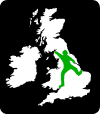
- The most recent issue to be published was 133
- For further information, please see Publishing/Despatch Schedule
- Database last updated on Sun, 25 Jan 2026 16:24:22 +0000
- Online access is currently available for all issues. Some of
the older issues are bit-map scans rather than digital copies.
journal scans.
- Online voting for CREG articles was withdrawn in June 2022. For info see
Voting for CREG articles
Contents of journal 120
December 2022
This page may take a few
seconds to load. Please wait ...
- CREG Journal 120 (0-20)
(PDF 2.9MB)
  Individual articles may be available below Individual articles may be available below
- This issue has a cover date of December 2022 and was published on 31 December 2022.
-
- Front Cover (1)
(PDF 358KB)

- A semi-duplex dual-wire cave telephone in operation. Photo: Nuraniya Ilyasova
-
- Contents (2)
(PDF 325KB)

- List of contents and masthead information.
-
- News and Notes (2) For download see previous item
- CREG Committee Meetings, Regular Columns, Hybrid Field Meeting 2023, Rob Gill.
-
- A Semi-duplex Dual-wire Telephone for Expedition or Cave Rescue Use (3-5)
(PDF 696KB)

- Single-wire telephones have been featured here on several occasions. However, according to Gleb Kucherovskiy, despite its requirement for twice the weight and bulk of the line, twin-wire telephones can have performance benefits. Here he provides full constructional details of a twin-wire telephone for caving use.
-
- A Miniaturised Radiolocation Beacon with a Ferrite Core (6-8)
(PDF 559KB)

- Brian Pease describes a small self-contained radiolocation beacon that incorporates an antenna constructed from a stack of toroidal ferrite cores. This design eases transport and deployment underground, compared with larger frame antennas, and is useable to a depth of approximately 75m.
-
- We Hear (9)
(PDF 357KB)

- Roundup of news and events: Mike Bedford brings us the latest to impact the world of cave radio and electronics. Solid-State Batteries Closer to Reality, Affordable Shortwave UV Flashlight, Raspberry Pi as a Tiny PC for Caving Use?
-
- Geophysical Survey Techniques (10-12)
(PDF 562KB)

- Tony Haigh provides an overview of a number of non-invasive techniques that have potential for discovering caves, mines and other underground features.
-
- Investigating Licence-free 433MHz and 2.4GHz Modules for use in Caving Projects (13-15)
(PDF 446KB)

- 433MHz and 2.4GHz transmitter, receiver and transceiver modules are cheap, and may be used legally in many countries. Mike Bedford considers how they may be used for caving applications and provides some practical guidance.
-
- HF Radio Experiments at Fort Stanton Cave, New Mexico, USA (16-19)
(PDF 702KB)

- Fort Stanton Cave continues to be explored, with current progress and campsites some 20km from the entrance. John T. M. Lyles, of the Fort Stanton Cave Study Project, has been testing HF radio data transmission as a possibility for communications in the cave.
-
- Letters to the Editor (19)
(PDF 203KB)

- Viewing stereo images, Stuart France, Brian Pease.
-
- Digital Object Identifiers - Part 1 (20)
(PDF 251KB)

- Digital Object Identifiers (DOI) are persistent long-lasting references, usually bound to a URL and intended to identify an online document. This makes them slightly different to, for example, an ISBN (book number), which merely identifies a product, because a DOI can also deliver a product. In this brief overview, David Gibson explains the DOI system used by the British Cave Research Association and, in part 2, will give examples of the webserver coding. He notes that BCRA does not use an official DOI implementation because surely, a URL is just a URL?
-

|

View Contents:

BCRA is a UK registered charity and is a constituent body of
the British Caving Association,
undertaking charitable activities on behalf of the BCA.
BCRA publishes a range of periodicals and books.
Click here for further information.
|
Searching
To Search our pages using Google, type a search
string in the box at the top of the page and hit your Return key
You can also search our publications catalogue at the British Caving Library
The CREG Journal Search Engine is a new, powerful search engine which will, sometime, be extended
to cover Cave & Karst Science. We have a keyword search facility on our Cave Science Indexes pages but this may be rather out-of-date.
|
For staff use: Link to Database
Show/Hide
download figures next to each item (if available and non-zero; you might need to refresh page first). Counters last
reset on Thu 03-Jan-2019 17:29:28 +00:00. The figures are non-unique
click-throughs.
|









